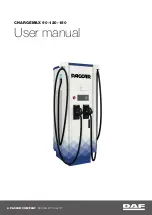
Let us say the road is wet and you are driving safely.
Suddenly, an animal jumps out in front of you. You slam
on the brakes and continue braking. Here is what
happens with ABS:
A computer senses that the wheels are slowing down.
If one of the wheels is about to stop rolling, the
computer will separately work the brakes at each wheel.
ABS can change the brake pressure to each wheel, as
required, faster than any driver could. This can help the
driver steer around the obstacle while braking hard.
As the brakes are applied, the computer keeps
receiving updates on wheel speed and controls braking
pressure accordingly.
Remember: ABS does not change the time needed to
get a foot up to the brake pedal or always decrease
stopping distance. If you get too close to the vehicle in
front of you, there will not be enough time to apply the
brakes if that vehicle suddenly slows or stops. Always
leave enough room up ahead to stop, even with ABS.
Using ABS
Do not pump the brakes. Just hold the brake pedal
down firmly and let antilock work. A slight brake pedal
pulsation might be felt or some noise noticed, but this is
normal.
Braking in Emergencies
At some time, nearly every driver gets into a situation
that requires hard braking.
If the vehicle has Electronic Stability Control (ESC)
with Antilock Brake System (ABS), it allows the driver
to steer and brake at the same time. However, if the
vehicle does not have ESC with ABS, the first
reaction
—
to hit the brake pedal hard and hold it
down
—
might be the wrong thing to do. The wheels can
stop rolling. Once they do, the vehicle cannot respond
to the driver's steering. Momentum will carry it in
whatever direction it was headed when the wheels
stopped rolling. That could be off the road, into the very
thing the driver was trying to avoid, or into traffic.
If the vehicle does not have ABS, use a
“
squeeze
”
braking technique. This gives maximum braking while
maintaining steering control. Do this by pushing on the
brake pedal with steadily increasing pressure.
In an emergency, you will probably want to squeeze the
brakes hard without locking the wheels. If you hear or
feel the wheels sliding, ease off the brake pedal. This
helps retain steering control. Without ABS, it is different.
See
Antilock Brake System (ABS) on page 5
‑
4
.
In many emergencies, steering can help more than
even the very best braking.
5-5
Summary of Contents for 2010 Cobalt
Page 6: ...2 NOTES vi ...
Page 8: ...Instrument Panel 1 2 ...
Page 30: ...2 NOTES 1 24 ...
Page 106: ...2 NOTES 2 76 ...
Page 272: ...2 NOTES 5 40 ...
Page 288: ...When you open the hood on the 2 0L L4 engine this is what you will see 6 16 ...
Page 366: ...A Cover B Retainer C Spare Tire D Wing Nut E Jack and Wheel Wrench F Bolt 6 94 ...
Page 420: ...Maintenance Record cont d Date Odometer Reading Serviced By Services Performed 7 16 ...
Page 421: ...Maintenance Record cont d Date Odometer Reading Serviced By Services Performed 7 17 ...
Page 422: ...Maintenance Record cont d Date Odometer Reading Serviced By Services Performed 7 18 ...
















































